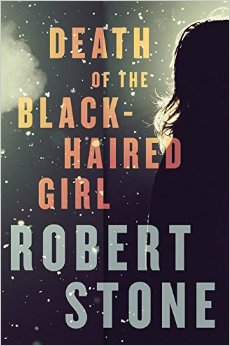 “People all want their suffering to mean something.”
“People all want their suffering to mean something.”
In one of the last sentences of his newest novel, The Death of the Black-Haired Girl, Robert Stone manages to sum up how I felt by the time I reached the end. This book had my suffering through almost 300 pages of sophisticated, emotionless prose that left me feeling cheated.
In recent months I’ve learned that I really enjoy a book that tells you what to expect before you begin and then still delivers a riveting story with twists and turns you couldn’t have imagined if you tried. John Green is, in my opinion, a master of this (read The Fault in Our Stars or Looking for Alaska if you want to be exquisitely tortured and awed by this method of storytelling), and at first it seemed that this would be another story with a similar plot twist. I can honestly say that the death of the black-haired girl, when it finally arrives, was shocking and unexpected (despite the title fore-telling it from the get-go). Unfortunately, the rest of the novel never seems to catch on to the title’s premise.
Starting out, I thought this was going to be, judging from the title alone, a mystery, a story surrounding the death of, not a black-haired girl, but the black-haired girl, an ambiguous, but no less important, title to bestow upon the critical character, Maud, an idealistic college-student in college-love with her college professor, Steve Brookman. Whew, that was a long sentiment to cram into a single run-on sentence, but given the book’s own lofty prose I think it should be forgiven.
Truth be told, it took me a few tries to get into the highly intellectual style Stone uses to describe the characters and their world from page one. But after I read a few pages I started to find myself drawn into the cold and bleak college town, and the main attraction, the love affair between Brookman and Maud, caught me up so that I was a quarter of the way through the novel in no time.
Unfortunately, what could have been an intriguing whodunit turned into a rather trite examination of religion, morals, and self-satisfying pity. The characters all fall flat, perhaps because Stone attempts to connect too many together in a rather slim book (there were more than six main characters circulating around the POV). Or perhaps they fall flat because they are, for the most part, self-absorbed assholes, whose grief over Maud’s death feels rehearsed and tired, and inspired no sadness in me at all. I wanted to care about the characters, and in the beginning I found myself sort-of caring about Brookman and Maud, but before I was half way through I was begging to be done. The dense prose lacked movement, and the backstory of some of the characters felt unnecessary, as the book promised to be about Maud’s death, but seemed to be more about the past of those she left behind, who all seem rather unaffected given the circumstances. Unfortunately, it was equally impossible to like Maud, who is portrayed as a reckless, drug-addict, entitled college student with a grudge against everybody just for the sake of it. Her death, while sudden, elicited only a shrug of the shoulders and a “oh well,” in me rather than any kind sense of loss or mourning.
I’d like to think that I didn’t enjoy this book because it wasn’t what I expected going in, but I’m afraid I’d only like to think that because I want to give my suffering at the hands of this book some meaning. And sometimes in life, that’s an impossible task.
Rating: 2.5/5 stars
Overall Reaction: Meh
Good review. Keep it up.
xoxo – Glori